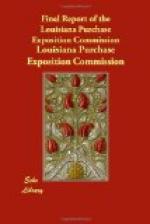It is proper to say that prior to the submission to the Commission of the proposed rule, or modification of the rules, announcement had been made in the newspapers of St. Louis that such tickets would be sold by the company, and, in fact, the sale of the proposed tickets had already begun.
The following letter contains the proposal of the company to authorize the sale of such special tickets to stockholders only:
MAY 18, 1904.
DEAR SIR: I am directed by the executive committee of the Louisiana Purchase Exposition Company to inform the National Commission that the committee has approved the following resolution:
Resolved, That a ticket, photographic, nontransferable, having 50 coupons good for admission at any time during the World’s Fair shall be sold to stockholders at the rate of $12.50; this privilege to continue to and including June 15, to be open to all who shall be stockholders up to and including that day.
I am directed by the executive
committee to ask favorable action
upon the resolution by the
National Commission.
Respectfully,
WALTER B. STEVENS,
Secretary.
Mr. JOSEPH FLORY,
Secretary National Commission.
It was the opinion of the National Commission that the sale of the proposed tickets to stockholders alone at the reduced price proposed was in the nature of a dividend or pecuniary benefit in which the United States Government could not participate, and therefore contrary to law; and in view of the fact that the people of the United States had contributed through the Government appropriation for the exposition an amount of money equal to that which had been furnished by the stockholders of the company it seemed to the Commission that no special privilege respecting the purchase of tickets should be given such stockholders that was not given equally to all citizens of the United States.
This view was especially enforced by the consideration that stockholders of the company had subscribed for such stock in the belief that the citizens of the city of St. Louis would reap large local benefits from the holding of the fair in that city, while it was obvious that the other citizens of the United States could not in any degree participate in such benefits.
The Commission, believing that the sale of special coupon tickets at that time would increase the revenues of the company at a time when such increase seemed to be especially desirable, submitted to the company a modification of the proposed rule, as set forth in the following letter:
MAY 19, 1904.
DEAR SIR: I am directed
by the National Commission to inform you
that they have had under consideration
the resolution contained
in your esteemed favor of
18th instant, reading as follows:




